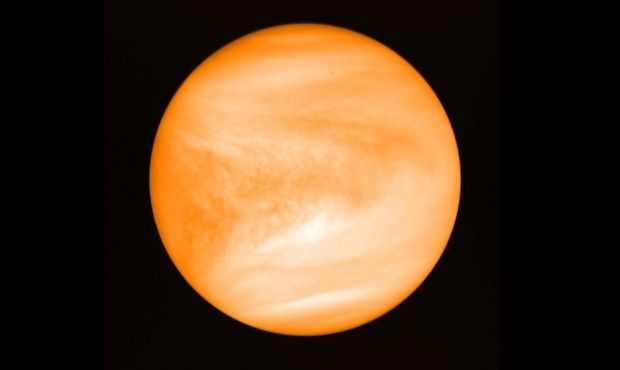Would visiting life on Venus violate Star Trek’s Prime Directive?
Sep 16, 2020, 5:02 PM | Updated: Sep 17, 2020, 10:40 am

This May 2016 photo provided by researcher Jane Greaves shows the planet Venus, seen from the Japan Aerospace Exploration Agency's Akatsuki probe. A report released on Monday, Sept. 14, 2020 says astronomers have found a potential signal of life high in the atmosphere of our nearest neighboring planet. (J. Greaves/Cardiff University/JAXA via AP)
(J. Greaves/Cardiff University/JAXA via AP)
On Monday, a group of astronomers announced that there may be life on Venus. Using powerful telescopes, they detected the molecule phosphine in the planet’s atmosphere.
“The molecule is not itself alive, it’s just four atoms, a phosphorus and three hydrogens,” said Dr. Sarah Ballard, professor of astronomy at the University of Florida. “The reason why much is being made of it is because there is no known way to produce phosphine on a terrestrial planet which does not involve living things.”
Full disclosure: Dr. Sarah Ballard happens to be one of my close friends. I like to brag about the fact that she discovered four new exoplanets before she turned 30, doing some of that work at the University of Washington as a NASA Carl Sagan fellow. But the reason I wanted to interview Dr. Ballard is because she does not hold the same opinion as many astronomers who are anxious to start getting up close and personal studying Venus. She thinks we need to slow down and consider the ethical consequences.
“I have an unusual position among scientists, in that I think it likely is life and we shouldn’t go. I think most scientists are in the opposite corner, where they think it isn’t life and we should go to understand what kind of exotic chemistry is going on,” she said.
“There are two reasons for why I’m very hesitant to jump right in and go,” she explained. “One of them is because it’s impossible not to contaminate Venus with Earth life if we send spacecraft. There have been spacecraft that have visited Venus and gone even to the surface of Venus where they were immediately crushed and destroyed. Venus is not particularly habitable. However, even putting something into outer space, there can still be living things on it. It is extremely hard to kill all organisms from Earth; even in the vacuum of space things can stay alive. So that means almost certainly, if we sent a spacecraft, the risk would not be zero that we are putting life into a situation which right now might be pristine. The second reason is because in Star Trek there’s something called The Prime Directive, which is basically a moral position about how you shouldn’t interfere with developing civilizations. It should be treated as if it’s a nature preserve, basically. There’s something ethical about it.”
Dr. Ballard thinks we need to be careful we don’t use curiosity as the number one reason to justify actions that might harm or destroy life on Venus, or any other place in the solar system.
“We have a really mixed history on Earth of using science to justify entry into spaces where we weren’t before,” she said. “I also think that the question of whether we should go shouldn’t just be a scientific question. I think it’s a question that everyone should weigh in on. Not only because taxpayer dollars fund NASA, but also because I think it is an enormously moral question, which extends beyond what scientists can answer. Which is, have we reckoned within our own history enough to feel like it’s moral to go to another planet where there might be life and interfere with it? And yet, nobody is more voraciously curious than me about what it is and whether it has DNA! Nobody wants to know more than me. But the fact that I have such a strong investment and such a strong bias for wanting to understand it means I need to be that much more careful at interrogating my motivation.”
Dr. Ballard also points out that phosphine exists on Earth and is incredibly toxic to humans and other living things, making it a dangerous mission. If research was conducted, and samples were collected, it would need to be done near Venus and would rely upon robotics and AI to do the work for humans.













